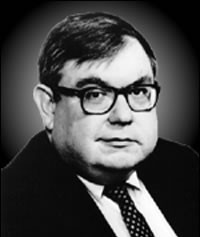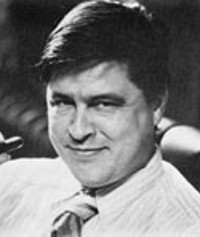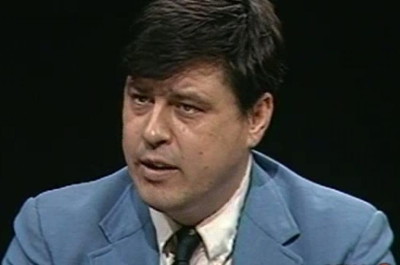 Samuel T. Francis
Samuel T. Francis
Championing
Western Civilization
and the great legacies of
Sam Francis and Joe Sobran
and their allies
 Joseph Sobran
Joseph Sobran
FGF Op-Ed
February 23, 2022
What Would Joe Sobran Say?
Today is the anniversary of Joe Sobran’s 76th birthday. The following article by Peter Maruice was published in the January-February 2022 edition of The New Oxford Review

New Oxford Review, January-February 2022 — Comedians find it easy to imitate the distinctive voice of an actor. Not all actors have a trademark voice, but those who do make easy work for the impersonator.
Sobran’s was one of those distinct voices, hard to define but easy to recognize. You might describe it – inadequately -- as an erudite blend of moral earnestness and playful humor.
Joe Sobran (1946-2010) was a writer by trade, not a mimic, but he amused his friends on the police force by barking out from his car window, à la James Cagney, “You’ll never take me alive, Copper!”
A passable takeoff is not so easy with a writer who has an identifiable voice. Try simulating a page in the tone of Charles Dickens or Samuel Johnson: satisfaction is not guaranteed. Sobran’s was one of those distinct voices, hard to define but easy to recognize. You might describe it — inadequately — as an erudite blend of moral earnestness and playful humor. This essayist who defined prejudice against homeless people as “hobophobia” obviously didn’t share Dr. Johnson’s disdain of the pun as the lowest form of wit. Sobran’s almost Shakespearean coupling of wordplay with high sentence was more in the style of another of his avatars, G.K. Chesterton.
Sobran’s almost Shakespearean coupling of wordplay with high sentence was more in the style of another of his avatars, G.K. Chesterton.
A critic once clucked that Chesterton’s jokes and paradoxes comported ill with momentous themes like “Truth and Progress.” Chesterton rejected the dichotomy. The critic, a Mr. McCabe, Chesterton wrote, “thinks that I am not serious but only funny, because Mr. McCabe thinks that funny is the opposite of serious. Funny is the opposite of not funny, and of nothing else.” Sobran, too, was both serious and funny.
To be fortified and entertained by his moral depth and his sometimes caustic but usually lighthearted wit, NOR readers who’ve never read Sobran (if there are such) could do no better than to sample the essays in Subtracting Christianity, the 2015 anthology compiled by his friends and admirers, Fran Griffin and the late Tom Bethell, a contributing editor of the NOR. The reader will find therein over a hundred essays on government, faith, papal politics, the new atheism, abortion, saints, and writers and artists, along with 18 autopsies of postmodern culture, which Sobran dubs “The New Dark Age.”
The reader will find therein over a hundred essays on government, faith, papal politics, the new atheism, abortion, saints, and writers and artists, along with 18 autopsies of postmodern culture, which Sobran dubs “The New Dark Age.”
Help FGF Books to reprint the collection of Sobran essays titled Subtracting Christianity by making a donation here.
I would suggest starting with the title essay. In “Subtracting Christianity,” Sobran addresses a story from the headlines of 1999: the Columbine school shooting. Reams of commentary had already poured from the press, psychoanalyzing the two alienated trench-coat goths who’d shot 13 of their schoolmates before turning their guns on themselves. Government commissions and panels of experts were convened to make sure, as they have repeatedly since, that nothing like this will ever happen again. Innovative solutions were called for: spotting early warning signals, hiring more counselors, implementing anti-bullying programs, and, of course, stricter gun control. All dredged up, thought Sobran, from the dry well of bureaucratic futility.
Like the prophets of old, Sobran had nothing new to offer. He was not an innovator. He could see no “root causes” as understood by the secular experts, at least none ameliorable by their generic prescriptions. The society that spawned the teen killers was a negative residue: it’s “what’s left when you subtract Christianity” from civilization. This “barren, bloodless, desiccated” thing called “secular humanism” was the last place to look for a cure for the contagion it had fostered. Rather than turning to some contemporary expert or blue-ribbon committee for solutions, Sobran looked back, as was his wont, to the unfashionable notion of Original Sin. And to Dostoyevsky, who wrote, “If God does not exist, everything is permitted.” Perhaps the shooters were merely using their permission slips.
Because he reasoned from first principles, one can guess what Sobran would have thought about many of our current religious and political controversies. I know what he would have thought of the hypertrophy of government during the coronavirus pandemic; of Church compliance with the suspension of “non-essential” services; of the media-abetted mayhem in the wake of George Floyd’s death; and of the ascendency of woke ideology and the cancel culture. The murky election of Joe Biden surely would have provoked Sobran’s satiric pen. But how would he have formulated his counterattack? What would he have said? It is here that the imagination balks.
In the essay, “Subtracting Christianity,” Sobran addresses a story from the headlines of 1999: the Columbine school shooting. Rather than turning to some contemporary expert or blue-ribbon committee for solutions, Sobran looked back, as was his wont, to the unfashionable notion of Original Sin.
Pat Buchanan, Paul Gottfried, Bishop Fabian Bruskewitz, Fr. John McCloskey, and many other lettered priests and laymen variously eulogized Joe Sobran as one of the deepest, wittiest, and most wide-ranging essayists of his time. But his rapid slide into obscurity was predictable. He wrote as an imperfect but forthright Catholic whose faith informed nearly all he surveyed. And he was a satiric scourge of the “best people,” whom complacency approves even as they subvert what remains of civilized norms. Among those best, or most influential (Sobran suspected a difference), were the “neocons” who cheered on our wars of choice to spread democracy. In one of his many anti-war essays, Sobran pondered the difference between women and neoconservatives: “You can get a few women to go into combat.”
From the start of the Bush wars in the early 2000s, Sobran doubted the wisdom of using our proven weapons of mass destruction to eliminate Saddam Hussein’s rumored weapons of mass destruction. Sobran’s objections were rooted in justice and prudence, virtues in short supply in the realms of power. Spreading democracy and eliminating evil might not be compatible with just-war precepts. Blowing things to smithereens, whether by high-altitude bombardment or “surgical” strikes, might not endear us to those we want to liberate. “If termites could talk,” he averred, “they’d call what they’re doing to the house progress.”
Sobran wrote as an imperfect but forthright Catholic whose faith informed nearly all he surveyed. And he was a satiric scourge of the “best people,” whom complacency approves even as they subvert what remains of civilized norms.
For a while such probity and wit were enough to secure for the young man from Ypsilanti, Michigan, a foothold in the literary redoubts of New York City. It was permissible for a novice to start out with “reactionary” tendencies. They could be indulged as the inheritance of a provincial upbringing. Such forbearance, in fact, flattered the broadmindedness of the indulger. But what if the apprentice didn’t outgrow those Ypsilanti values?
When it became clear that the small-town wunderkind lacked malleability, he was no longer seen as one of us, but one of them: an extreme right-winger, an ultraconservative, a “Christer.” Once so defined, Sobran was no longer needed to advance the national conversation with urbane liberals and domesticated conservatives. Talk-show hosts don’t need an “extremist” to manage with a commercial break coming up.
Among those best, or most influential (Sobran suspected a difference), were the “neocons” who cheered on our wars of choice to spread democracy. In one of his many anti-war essays, Sobran pondered the difference between women and neoconservatives: “You can get a few women to go into combat.”
A Christian of limber conviction, “uncomfortable” with the imperfectly reasoned Roe v. Wade — say, a Kennedy or a Biden — is tolerable. The “personally opposed” formula doesn’t threaten the progressive sensibility. But Sobran’s rigidity (lib-speak for “character”) meant that his views couldn’t keep up with the times. For Sobran, abortion was not an “issue” inviting different perspectives. One side was right, the other tragically and damnably wrong. Such intractability drew the standard devil-terms: racist, anti-Semite, Islamophobe, homophobe, elitist, reactionary. While liberals go to the wall — or tear it down — for the marginalized, no one is more extramural than a Catholic traditionalist whose faith is other than a metaphor.
In 1972 William F. Buckley Jr. recruited Sobran, while the latter was still in college, to serve as an editor and columnist for National Review. Buckley, too, was a Catholic. But his Catholicism, unlike Sobran’s, comported with a highly polished persona: audacious but hardly missionary. It would be jejune (a favorite Buckleyian term) to say that he compartmentalized his faith. But after Buckley’s combative God and Man at Yale (1951) receded from controversy, the secular elite indulged his Catholicism, as they did his colorful paeans to constitutional monarchy, Southern segregation (a transitional exigency), and other quixotically doomed causes. There were flareups, when the patrician hauteur came off, along with the gloves. Buckley once threatened to “sock” Gore Vidal “in the g**d*** face.” But this riposte was provoked by Vidal’s “crypto Nazi” crack, a personal affront.
From the start of the Bush wars in the early 2000s, Sobran doubted the wisdom of using our proven weapons of mass destruction to eliminate Saddam Hussein’s rumored weapons of mass destruction. Sobran’s objections were rooted in justice and prudence, virtues in short supply in the realms of power. Spreading democracy and eliminating evil might not be compatible with just-war precepts.
Buckley never betrayed such visceral militancy as a defender of the faith. He claimed to possess neither “evangelistic skill or inclination.” In an interview with Malcolm Muggeridge, he admitted reluctance about being classed as a “Christer,” a label Muggeridge blithely accepted. In Buckley’s book Cruising Speed (1971), in which he describes a frenetic week in the life of the celebrity writer, Buckley comes across as a temperament unsuited for contemplation. No one ever mistook him for a bead-telling, pious naïf. Once, when Sobran had too closely associated with the type, Buckley cautioned him to keep “those people” at arm’s length. Sobran had always thought of them as “our” people. He didn’t take Buckley’s advice. His columns kept dogging themes that a shrewd careerist would have dropped. In 1993 he was fired from National Review. Thereafter, his writing continued to grace the pages of Catholic publications such as The Wanderer and Human Life Review.
Sobran’s disdain for simpleminded bigotry didn’t preclude reflections that opened themselves to “interpretation.” He confessed that rational attention to self-preservation in unfamiliar neighborhoods might, unfortunately, justify wariness. He observed that stereotypes, like truisms, persist because they are partially true. His sympathy with the devout Muslim’s revulsion for the West’s cultural decadence didn’t prevent him from noticing that Islamic states routinely persecute Christians and Jews; hence, he was both “anti-Semitic” and “Islamophobic.” Such calumnies provoked Sobran’s nostalgia for the “good old days when people made direct insults without disguising them as diagnoses.”
Sobran’s rigidity (lib-speak for “character”) meant that his views couldn’t keep up with the times.
Like Chesterton, who also wrote profusely under the constraint of deadlines, Sobran was not always at the top of his game. But there would always be a phrase, an analogy, or an insight, dropped as if in passing, that sent you to your commonplace book. His depth of thought and refinement of language were erudite without being pedantic, colloquial without being vulgar. He could be as epigrammatic as François de La Rochefoucauld, but always in the American key.
Sobran was usually magnanimous with adversaries. He admitted, for example, that the “learned and eloquent” atheist Christopher Hitchens (of god Is Not Great notoriety) had “gored and tossed” him in debate. But he was more likely to draw from Shakespeare and Dr. Johnson, Chesterton and C.S. Lewis — the Western tradition of eloquence, explicitness, and reason wedded to faith. With Edmund Burke, he saw the civilizing necessity of taboos and censorship. “Smut” deserved no judicial protection under the rubric of free speech, Sobran argued. When it came to modern genres — flash fiction, installation art, Andres Serranno’s NEA-funded desecrations, rap music, etc. — he was either bemused or dismissive.
For Sobran, abortion was not an “issue” inviting different perspectives. One side was right, the other tragically and damnably wrong. Such intractability drew the standard devil-terms: racist, anti-Semite, Islamophobe, homophobe, elitist, reactionary.
Sobran’s habit of looking “backward” for a guidepost to the highroad from which civilization had careened offended progressive and deconstructionist sensibilities. Anyone who shared his pre-postmodern predilections was derided by group-think academics and journalists as centric, phobic, and medieval. If Sobran had looked no further back than to the cultural critiques of Lenin, Marx, Sartre, Nietzsche, and Freud, he might have been given a pass. Because they hated Christendom.
Needless to say, none of this promoted a mass fan base or seeded a legacy. I ran across a tagline on the masthead of a Federalist broadsheet that could serve as Sobran’s motto: “…to lash the scoundrels naked through the world.” The scoundrels didn’t like it.
Sobran’s tone was often exuberant. It is impossible to feel forlorn while reading him. Perhaps this is because he shared Chesterton’s conviction that this world makes for a miserable truce but a good war.
The media didn’t like having its pretensions to impartiality exposed. Sobran enjoyed ridiculing the press’s lexicographical shapeshifting. He would discern the plain meaning of a word within the densest connotative fog. The transitive verb to choose wanted an object — which then made the meaning clear: “to kill.” Progressive was another blurring for the starker but less marketable “socialist.” Even terms like democracy and capitalism, he noticed, were often used as hypnotic incantations, and Sobran refused to be hypnotized. He called attention to what the reader or viewer was conditioned to imbibe — like gin — rather than analyze. Words like strident, ideological, closeminded, and extremist were welded to “right-wing.” Was there such a thing as a left-wing extremist?
Nothing said here will resuscitate this great talent from the general amnesia. But those happy few who read Joe Sobran will be better armed against the armies of dissolution.
Before closing this recollection, I should mention one twist in Sobran’s political evolution that NOR readers might find rebarbative. In the last years of his too-short life, Sobran identified as a “theo-anarchist.” For most, including this writer, the merest whiff of anarchy conjures up Serbian assassins, campus arsonists, Antifa thuggery, and the like. Sobran shouldn’t be classified with that larval stage of development. His so-called anarchy was born of a recognition that government had far exceeded its constitutionally defined sphere and thus had become an agent of disorder, an enabler of uncivil society. Despite Sobran’s incapacity for ordering his personal space (described in Chilton Williamson’s “Joe Sobran as I Knew Him,” Chronicles, Dec. 2010), he remained a lover and practitioner of civility and civil order. But he recognized a growing problem and characteristically expressed it in a piquant metaphor: “Expecting the federal government to improve the human condition is like expecting a tiger to pull your plow.”
Sobran often wrote of decline. The tide of Western civilization and Christendom — synonymous terms in his view — were at the ebb. The near oblivion into which his work has fallen seems to ratify his cultural forebodings. And yet, despite the crepuscular themes, Sobran’s tone was often exuberant. It is impossible to feel forlorn while reading him. Perhaps this is because he shared Chesterton’s conviction that this world makes for a miserable truce but a good war. Sobran’s cultural and historical memory informed him that the permanent things are never finally won or forever lost. The battle continues, and those who reject the miserable truce are entitled to a warrior’s exuberance. Nothing said here will resuscitate this great talent from the general amnesia. But those happy few who read Joe Sobran will be better armed against the armies of dissolution.
###
Copyright @ 2025 by New Oxford Review, which published this article by Peter Maurice in their January-February 2022 edition.
Peter Maurice, a native of New Orleans who resides in Washington, Missouri, is a retired teacher of French, English, and humanities at all levels, from elementary through university. He is the recipient of several fellowships from the National Endowment for the Humanities. His writing has appeared in The Wanderer, Chronicles, Touchstone, Crisis, and Gilbert! magazines.
Joe Sobran (1946-2010), a syndicated columnist for 35 years, was a CBS Spectrum commentator, an author, and sought-after lecturer. Considered to be one of the greatest essayists of the 20th century, Sobran is often compared to G.K. Chesterton and H.L. Mencken.
Help promote the legacy of Joe Sobran’s great body of work. Donate now
Or mail your tax-deductible donation to: Fitzgerald Griffin Foundation344 Maple Avenue West, #281
Vienna, VA 22180
1-877-726-0058
publishing@fgfbooks.com
Or call us toll-free at 1-877-726-0058
Thank you for your support of Joe Sobran’s legacy!